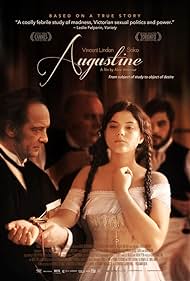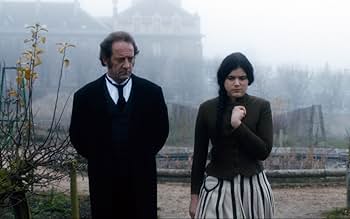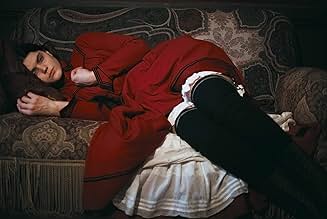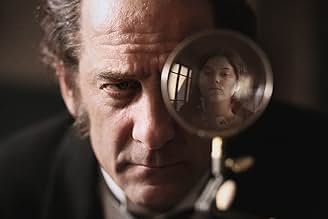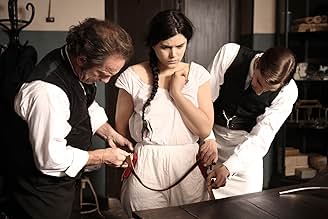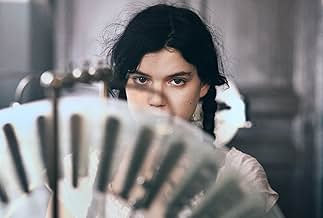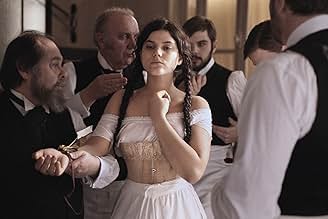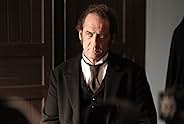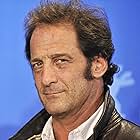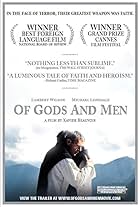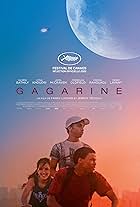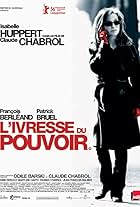VALUTAZIONE IMDb
6,1/10
1662
LA TUA VALUTAZIONE
Aggiungi una trama nella tua linguaA look at the relationship between pioneering 19th century French neurologist Dr. Jean-Martin Charcot and his star teenage patient, a kitchen maid who is left partially paralyzed after a sei... Leggi tuttoA look at the relationship between pioneering 19th century French neurologist Dr. Jean-Martin Charcot and his star teenage patient, a kitchen maid who is left partially paralyzed after a seizure.A look at the relationship between pioneering 19th century French neurologist Dr. Jean-Martin Charcot and his star teenage patient, a kitchen maid who is left partially paralyzed after a seizure.
- Regia
- Sceneggiatura
- Star
- Premi
- 4 vittorie e 11 candidature
Trama
Lo sapevi?
- QuizBenoît Poelvoorde was originally attached to play Charcot.
Recensione in evidenza
This slow and subtitled French film that is based on actual events won't be one many are going to out-right enjoy although I found it to be rather interesting as I find its subject matter -- 19th century female hysteria -- to be most fascinating.
The film is about Augustine, an illiterate young French housemaid (played by French singer/actress Soko), who suffers a debilitating seizure one evening while serving dinner that leaves her partially paralyzed. She is thus admitted to the Parisian psychiatric hospital, Pitié-Salpêtriere, where she is diagnosed as a hysteric (!) and treated by renown physician Jean-Martin Charcot (Vincent Lindon - Mademoiselle Chambon).
The medical world of the 19th century was dominated by uber-intelligent men (that "intelligent" part could be debated) and it was common for a woman who experienced something that a man couldn't easily explain and/or understand to be diagnosed with "hysteria" (a "nice way" of saying a female sexual perversion). If a woman acted in any manner society found confusing or even slightly objectionable, she was a "hysteric" who could find herself institutionalized and subjected to some horrifyingly abhorrent and offensive "treatment(s)" at the hands of men who claimed a medical interest in her well-being.
The time period and "understanding" of this predominately female ailment IS genuinely fascinating and if this topic sounds even remotely intriguing, I implore people to seek out the topic and read up on it as Augustine is merely about A case -- AN instance -- in this outrageously baffling era of medical (mal)practice when many male doctors found it to be en vogue and "fashionable" to make these diagnoses! The level of quasi-ignorance shared by these male "geniuses" in the medical field who simply did not understand women is mind-blowing.
I think a better film would have focused more on the doctor and his evolving understanding of hysteria over the years that followed this brief amount of time spent with this one patient, Augustine. There is a reason the film was not entitled Charcot. Instead, the direction of Alice Winocour (a WOMAN!!!?!) has used a specific example to reveal a sad universal truth of the time and expose just how farcical this "ailment" was while subtly implying perversions may have lain elsewhere. As Winocour's first full-length feature film that is clichéd a time or two, she shows much promise. Diagnose that, Charcot!
Again, the movie is hard to simply "enjoy" but it is one that could hopefully shed some more light on this bizarre chapter of modern medicine.
The film is about Augustine, an illiterate young French housemaid (played by French singer/actress Soko), who suffers a debilitating seizure one evening while serving dinner that leaves her partially paralyzed. She is thus admitted to the Parisian psychiatric hospital, Pitié-Salpêtriere, where she is diagnosed as a hysteric (!) and treated by renown physician Jean-Martin Charcot (Vincent Lindon - Mademoiselle Chambon).
The medical world of the 19th century was dominated by uber-intelligent men (that "intelligent" part could be debated) and it was common for a woman who experienced something that a man couldn't easily explain and/or understand to be diagnosed with "hysteria" (a "nice way" of saying a female sexual perversion). If a woman acted in any manner society found confusing or even slightly objectionable, she was a "hysteric" who could find herself institutionalized and subjected to some horrifyingly abhorrent and offensive "treatment(s)" at the hands of men who claimed a medical interest in her well-being.
The time period and "understanding" of this predominately female ailment IS genuinely fascinating and if this topic sounds even remotely intriguing, I implore people to seek out the topic and read up on it as Augustine is merely about A case -- AN instance -- in this outrageously baffling era of medical (mal)practice when many male doctors found it to be en vogue and "fashionable" to make these diagnoses! The level of quasi-ignorance shared by these male "geniuses" in the medical field who simply did not understand women is mind-blowing.
I think a better film would have focused more on the doctor and his evolving understanding of hysteria over the years that followed this brief amount of time spent with this one patient, Augustine. There is a reason the film was not entitled Charcot. Instead, the direction of Alice Winocour (a WOMAN!!!?!) has used a specific example to reveal a sad universal truth of the time and expose just how farcical this "ailment" was while subtly implying perversions may have lain elsewhere. As Winocour's first full-length feature film that is clichéd a time or two, she shows much promise. Diagnose that, Charcot!
Again, the movie is hard to simply "enjoy" but it is one that could hopefully shed some more light on this bizarre chapter of modern medicine.
- twilliams76
- 14 apr 2014
- Permalink
I più visti
Accedi per valutare e creare un elenco di titoli salvati per ottenere consigli personalizzati
- How long is Augustine?Powered by Alexa
Dettagli
Botteghino
- Budget
- 3.980.000 € (previsto)
- Lordo Stati Uniti e Canada
- 107.352 USD
- Fine settimana di apertura Stati Uniti e Canada
- 13.616 USD
- 19 mag 2013
- Lordo in tutto il mondo
- 262.390 USD
- Tempo di esecuzione1 ora 42 minuti
- Colore
- Mix di suoni
- Proporzioni
- 1.85 : 1
Contribuisci a questa pagina
Suggerisci una modifica o aggiungi i contenuti mancanti

Divario superiore
By what name was Augustine (2012) officially released in Canada in English?
Rispondi